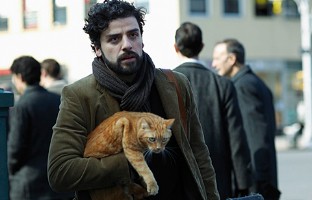Goin’ nowhere

Filmmakers Ethan and Joel Coen can entertain you with comedy (O Brother, Where Art Thou, Raising Arizona) or leave you gasping with their vision of the meaninglessness of life (No Country for Old Men, A Serious Man). Their film Inside Llewyn Davis mixes these two tendencies, but with the darkness far more determinative than the light.
The film is based loosely on 1960s Greenwich Village folksinger Dave Van Ronk. Llewyn Davis (played by Oscar Isaac) lives a decidedly unromantic existence as a starving artist. He goes from couch to couch, lodging with family and friends, then with friendly acquaintances and finally with strangers, alienating one after the other. He hauls along his guitar and a box of his records that he can’t sell. In one scene, he slides the box of records under a table until it bumps into something: an almost identical box of LPs that his host has and also can’t sell.
Davis is a good musician, but there are thousands like him, and they can’t all succeed. More than skill and hard work is required. Luck, sex appeal, and commercial savvy play a role, and Llewyn has none of those.





